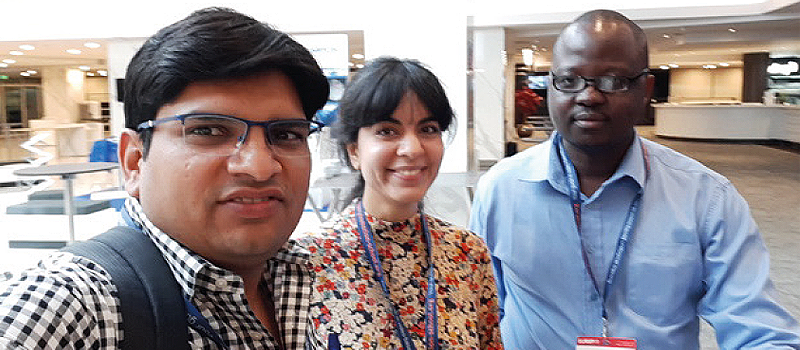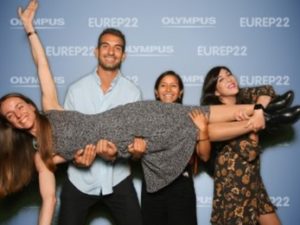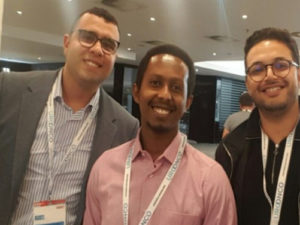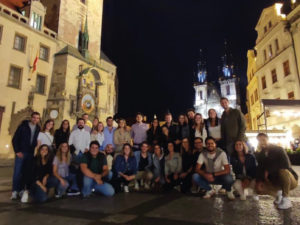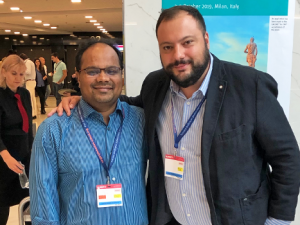By Dr. George Soko
University Teaching Hospital, Lusaka (ZM)
I participated at the 17th European Urology Residents Education Programme (EUREP19) in Prague, Czech Republic which was an experience that I will always cherish in my urology career. The generous efforts of Urolink’s Mr. Chandra Shekhar Biyani (Consultant Urologist) and Mr. Nicholas Campain, together with my chief/consultant urologist Dr. Nenad Spasojevic and Dr. Victor Mapulanga, ensured that a Zambian resident attended the coveted programme which is a first for my country.
On Friday, 06 September, I joined fellow final-year residents from other countries at the Clarion Congress Hotel Prague in Vysočany. It was extremely exciting to interact with other highly-motivated and enthusiastic residents.
The participants were divided into five groups in accordance with the five programme modules. These covered in-depth topics spanning from urological cancers (testicular, penile, renal and urothelial), male voiding lower urinary tract symptoms (LUTS), andrology, stones and upper tract urology, functional urology, paediatric urology, trauma, to infection.
The lectures delivered by internationally-known experts were compact yet covering all the major components of the latest EAU Guidelines in a lively, interactive and cordial atmosphere. They encouraged open participation, debate on clinical scenarios, publications and evidence that provided basis for the guidelines.
The presentations also included videos and multiple-choice questions which affirmed what the faculty members taught. The participants had an opportunity to give their feedback after every lecture session.
The lecture sessions were complimented with coffee breaks enabling participants to converse with colleagues from other countries, exchanging ideas on how to deal with urological cases, progression in urological career, and views on how certain practices vary in different centres.
I must admit that before the lectures started, the prospect of absorbing a plethora of urological information in just six days appeared daunting. The experience was far better than anticipated. The presentations were stimulating and riveting, particularly the case reports which were very interesting.
The key learning points of EUREP19 emphasised evidence-based urology and the sharpening of one’s skills to critically appraise publications. We also learned the importance of clinical acumen in applying proper diagnosis and management to achieve high-quality patient care.
HOT sessions
The Hands-on training (HOT) sessions were superb. We, residents, had the opportunity to interact with expert tutors one-on-one. They helped us improve our skills. We learned tricks applicable in routine practice.
The sessions included transurethral resection, ureteroscopy (URS), and laparoscopy. I participated in URS and laparoscopy trainings. They were marvellous and rewarding experiences. They bridged the gap in terms of training facilities of what we have in my country. The HOT sessions also offered a possibility for participants to take the European training program in Basic Laparoscopic Urological Skills (E-BLUS) assessment exam.
Balanced programme
EUREP19 was an excellent, well-balanced conference; the organisers integrated social events into the programme. The karaoke and barbecue on Sunday evening was a fun way of making new friends, enjoying performances from various national residents’ teams, and faculty members’ team. The party extended to James Deen Prague, which is a popular club in the city.
EUREP19 take-home messages
I have gained numerous insights which I am pleased to bring back to my country.
I was guided through the proper URS approach and manoeuvres for a successful procedure, particularly the use of Ureteral Sheaths (US). The US are not available at our hospitals. It was eye-opening to learn how US can aid good ureteroscopic procedures.
The tutors explained and coached me basic laparoscopic skills; on how to handle the instruments; and operation techniques in a clear, understandable manner. The simulators for urological surgery training are not available in Zambia. Exposure to complex models for effective learning was momentous.
It is also prudent clinical practice to make decisions relying on evidence-based guidelines.
Ultimately, the programme had a positive impact on how I should manage urology patients in my daily clinical practice. I hope more residents, especially from countries such as mine, will have the opportunity to attend future EUREP programmes.
Extending my appreciation
I wish to express my profound gratitude to Urolink through Mr. Biyani for the support rendered in ensuring my successful participation at EUREP19. The continued support of Urolink to urology in Zambia will have a lasting impact on good urology practice for many years to come. I am currently compiling some easy-to-use resource materials based on what was learned at EUREP, to share with other Zambian Urology residents.
I am grateful for the invaluable experience at EUREP and would like to thank the organising committee and European School of Urology (ESU). It will hopefully go a long way in inspiring a revamp of training facilities for urology trainees in Zambia.

